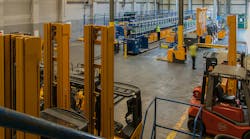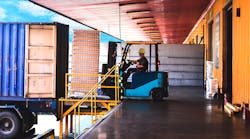If it isn't new, it can't be competitive." "Experts" who believe that are probably also likely to hold that "In America, workers must be fluent in English. Otherwise, nothing will run well."
So consider this: An old-line company has a factory that was built, in part, in the early years of the last century. It has a workforce that does not read English. The company could move anywhere in America, and many parts of the country would be delighted to offer incentives for it to relocate to their state -- as long as it left behind both its history and its employees. What would most companies do? Cook Communications Ministries of Elgin, Illinois, and Colorado Springs found a way to stay loyal to its roots while competing in 21st century America.
Cook makes all kinds of reading and support materials used in Sunday school classes throughout the country and the world. For generations (it was founded in 1875), Cook has been manufacturing and distributing these religious publications from its main plant and headquarters in Elgin. Headquarters is now in Colorado Springs; however, the company remained and remains committed to its employees in the Elgin area and to their historic buildings.
Yet, Cook Communications needed to expand to meet market demands. Its historic center was old -- part of it more than a century -- and could not provide the clear, straight avenues a new facility would offer in terms of flow efficiencies. On top of that, the demographics of the Elgin area had changed a lot in the past few decades. Most of the company's labor force was now Mexican-American and most did not speak or read much English. Some companies might have said: "Let's get out." Cook Communications decided to consider an expansion and a new material handling system that could keep it competitive and keep its work force working.
Cook Communications got together with WEi, engineers and systems integrators in nearby Elk Grove, and WEi in turn called in Kingway Material Handling of Acworth, Georgia. The three companies created and designed a material handling system that kept the company competitive, kept the work force employed and, therefore, kept the company in Elgin.
The expansion was required to stay within a height and footprint envelope that made it very difficult to enlarge the volume of the operation. So, WEi and Kingway installed a special mezzanine-material handling conveyor system that added operations space without crowding workers. Kingway's material handling system, in addition, is operated with its pick-to-light technology that allows non-English readers to work without any decline in speed or quality. In fact, the workforce is setting records in both areas.
The expansion, and the automation and semi-automation it contains have registered some pretty impressive stats since it began operating in mid-2002. Labor costs, for example, are down 30 percent. Order-pulling accuracy is nearly 100 percent. The Elgin plant, in turn, is connected electronically to Colorado Springs where much of the editorial and graphics work is now done for the company's many publications.
The increase in accuracy, as well as increases in speeds, is due to the new system itself as well as various special techniques. Material handling is integrated and controlled by the central AS/400 computer. A modified CAPS (Computer Aided Picking System) includes 1,680 lights and 61 Kingway aisle directors, which keep bottlenecks to near zero.
The modernized plant will be able to keep up with demands for the company's products for years, Cook Communications says. Kingway notes that the plant is designed to handle triple its present load.
These times are trying for manufacturers requiring a higher level of stability than others. Some factories must stay put for a long time, anchored by expensive equipment and highly trained workers. Lawyers and accountants need only offices -- which these days are almost portable. When the makers of things are finally forced to make new high-cost capital and training investments, they need creative managers like Cook's to help craft the solution.
George Weimer, contributing editor, [email protected]


